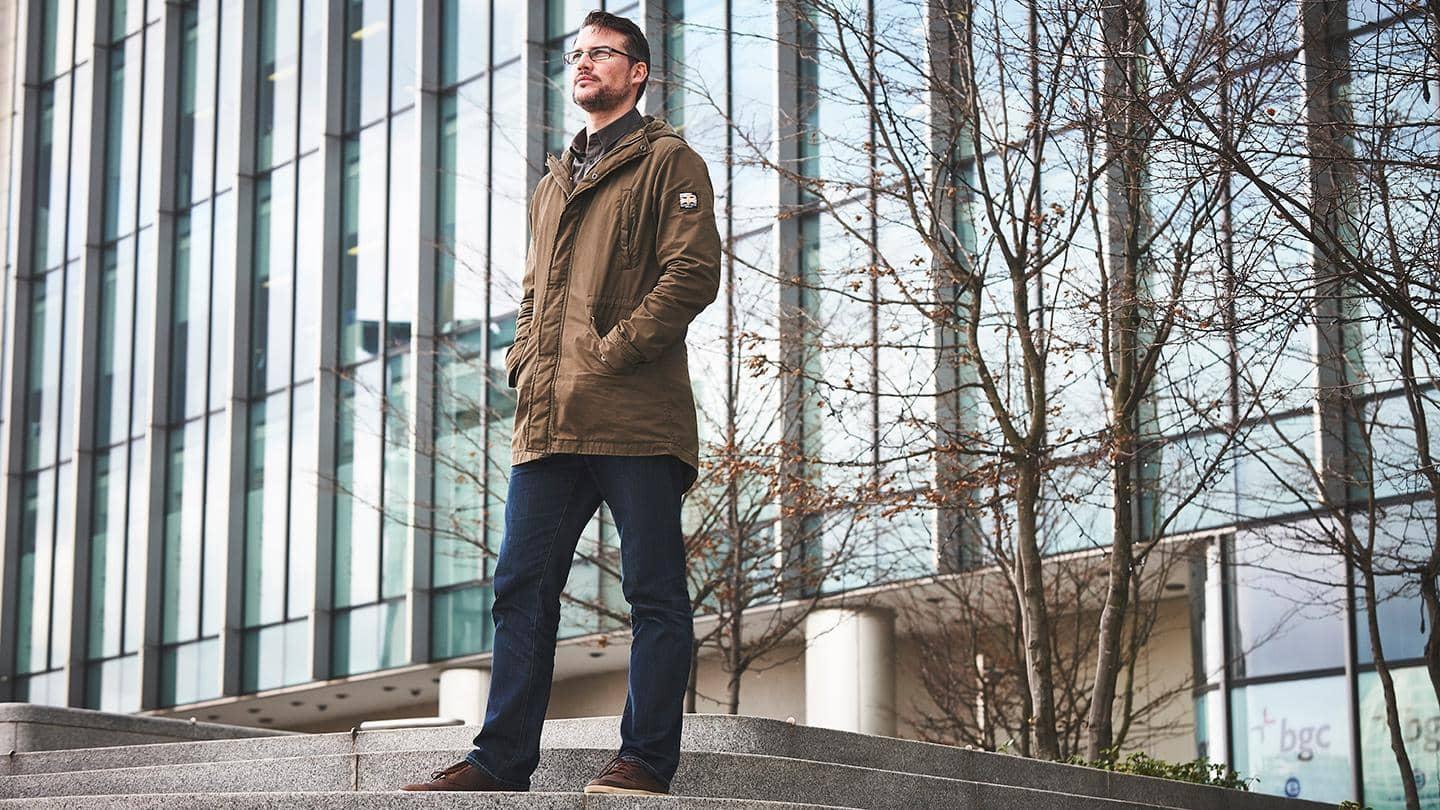
Innovation
How to beat the fraudsters
As fraudsters become ever more sophisticated, Barclays has released a range of products and services to help keep customers safe. For Ross Martin – Head of Education and Content for Barclays Digital Eagles – one of the key weapons against scammers is knowledge.
Ross Martin has been on the front line, seeing how fraud can affect customers. As a branch cashier, he witnessed “not just the financial impact on customers, but also the emotional consequences.”
Beginning his career with Barclays 18 years ago, Martin moved into the digital team in 2014 and is now Head of Education and Content for Barclays Digital Eagles. “It’s been really good to gain that understanding of what the customer goes through,” he says, “and in my role now I can add value and support my colleagues in helping those customers, because I also know the human face.”
Martin serves as the voice of some of the bank’s big anti-fraud and digital security campaigns, and he’s responsible for educating colleagues and customers in best practice to avoid falling victim to new scams. “Technology has given us an easier life and easier way to do things, but it’s also given fraudsters an easier way to commit crime,” he explains.

Young people at risk from fraud
Data from Barclays has revealed that young people are five and a half times more likely to fall victim to scams than those over 65, with 30% of 18 to 24-year-old scam victims believing “there is not much we can do” to protect themselves in future.
Over 65s, however, are affected more by impersonation scams – where a criminal pretends to be from the police or the victim’s bank and asks them to make a payment. These can be particularly devastating, with a third of cases reported to Barclays seeing losses of over £5,000.
Martin is surprised by young people’s resigned attitude. “You wouldn’t expect anyone to just accept losing money, and there are things we can do to change that mindset,” he says.
“Things are so sophisticated in the way scammers lure us, some people are always going to be susceptible to fraud or scams. That’s because the fraudsters are clever; as much as we now understand there are certain things to do to protect ourselves, they play on people’s emotions: they play on the curiosity of people clicking on links; or greed, where people think there’s an opportunity to gain from an offer.
“Barclays is aiming the ‘Take Five to Stop Fraud’ campaign at digitally native millennials and younger age groups because they have grown up using technology, and may be over confident and careless online, while the older generation might step back and not act on impulse in an environment where they’re not natives. Our message to younger people is to stop taking risks that make you turn victim.”
Peace of mind
Mitigating risk is a consistent theme in Martin’s fraud advice, and in the new products Barclays offers to help customers protect themselves. “The bank invests huge sums of money in the latest technologies. Algorithms can monitor people’s spending and can flag abnormal transactions, where we’ll proactively check with customers whether they’ve made the transaction.
“We need to do this in a way that doesn’t freeze people’s account for no reason, with the old trouble of your card getting stopped on holiday. We need tech that doesn’t inconvenience the customer, but where they also feel protected when things aren’t quite right.”
Barclays new ‘card freeze’ takes this a step further. While the clearest use of the feature – in which customers can put a temporary block on their own debit card – is for cards considered lost, Martin says: “If people are worried about an individual transaction they can temporarily block their card and prevent fraud while we look into it.
“Or sometimes, if people are going abroad, they freeze their card because they feel more vulnerable in a country where card-skimming or cloning is still more of an issue. The feature offers so much more than just a solution to misplacing a card – it can give the customer control and peace of mind to security concerns they might have.”
To guard against impersonation scams, Barclays has coupled a popular media campaign with a new call verification feature, allowing customers to check online with Barclays that the call is genuine. Another innovation is a proactive scheme inviting victims of fraud to face-to-face sessions sharing the best things to do to prevent a repeat crime. “We obviously don’t want people to fall victim to fraud,” says Martin, “but we do want to support them if they do, and we can refer them organisations who give specialist help.”

Intelligence sharing
The bank also increasingly shares information with other financial institutions to prevent the kind of fraud that can hurt them and their customers. Martin adds: “If one of the other big banks is seeing a particular scam, they’ll share that amongst the banks – and that wasn’t necessarily the case a few years ago. In the bigger picture, if a bank comes under a cyberattack, intelligence is shared.
“We also work with the likes of the Metropolitan Police and City of London Police who are very keen to understand how scams change – making it easier for them to go out and educate their officers and communities. You also have big government-backed organisations like Cyber Aware and Get Safe Online, who we work very closely with. There’s lots we try to do to make sure we stay joined up.”
It’s been a long journey for Martin. “I never thought as a cashier that I’d have the opportunity to be on the BBC or Sky News as a spokesperson for Barclays”, but educating colleagues, customers and community organisations about the best ways to avoid being scammed is an apparently never-ending job.
As for current advice, he says: “What we’re seeing as a growing trend is full-on identity theft. One thing I talk about a lot is that the information you share online could be a possible advantage to any criminal trying to steal your identity and get into your bank account, so we talk about being aware of sharing things on social media – look at your privacy settings, think about not posting pictures while you’re on holiday. And also – this advice has been around for a long time – don’t throw your bills in wheelie bins. Fraudsters can piece together information from a wide variety of sources.”
Ross Martin’s anti-scam checklist
Beware of special offers
If you see an offer in your inbox or text messages that looks too good to be true, it probably is. Be particularly careful during busy times such as the January sales, when fraudsters are likely to be out in force.
Watch out for the latest scams
Scams are becoming more sophisticated. Along with phishing emails and dodgy websites, cons now include smishing (phishing by text), online wish-list frauds, e-cards containing malware and social-media scams.
Take your time, look properly
Two thirds of survey respondents who had been victims of scams confessed to having existing concerns about cybercrime even before being conned. However, because they felt rushed and under pressure, they still didn’t take the time required to defend themselves by looking closely at suspicious websites or links before they clicked. It is always worth slowing down and taking the time to look properly.
Make sure the website you’re buying from is legitimate
Do basic due diligence to ensure an online seller is genuine before entering payment details. Look out for things like fuzzy imagery or any unusual requests for personal or bank details.
Stay on top of your bank account
Check your account regularly, looking for unfamiliar transactions. Contact the bank if you have any concerns.
Be cautious when on public wifi
It might seem convenient, but paying online through public wifi means you could be making personal details available to fraudsters.
Control your online purchases through an app
If you’re a Barclays customer, you can switch off remote purchases using the Barclays Mobile Banking app, making sure no one else can use your card to shop online.
Temporarily block a card
If you think you’ve lost a card or if you’re concerned you might have made it vulnerable to fraud, you can temporarily freeze it using the Barclays Mobile Banking app.